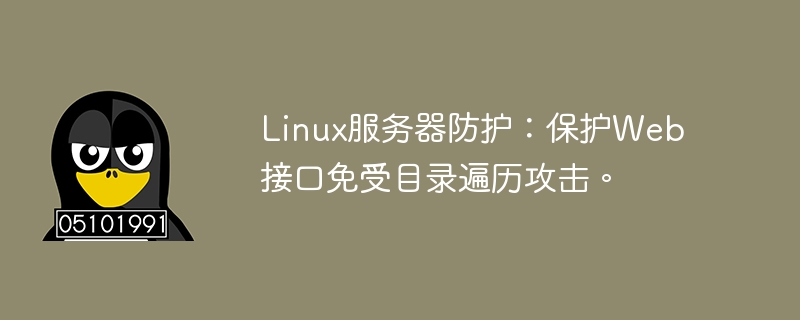

Linux Server Protection: Protecting Web Interfaces from Directory Traversal Attacks
Directory traversal attacks are a common network security threat in which an attacker attempts to access system file paths and sensitive files to gain unauthorized access. In web applications, directory traversal attacks are often implemented by manipulating URL paths, where the attacker enters special directory traversal characters (such as "../") to navigate to a directory outside the application context.
In order to prevent the web interface from directory traversal attacks, we can take the following measures to protect server security.
function validateInput(input) {
// 过滤掉特殊字符
const pattern = /../g;
return !pattern.test(input);
}
// 例子
const userInput = "../../etc/passwd";
if (validateInput(userInput)) {
// 处理用户输入
// ...
} else {
// 输入无效,可能存在目录遍历攻击
// ...
}import java.nio.file.Path;
import java.nio.file.Paths;
public class FileProcessor {
public void processFile(String filename) {
// 使用绝对路径
Path filePath = Paths.get("/var/www/html", filename);
// ...
}
}
// 例子
FileProcessor fileProcessor = new FileProcessor();
fileProcessor.processFile("index.html");For example, for the Apache server, you can set the following permission rules in the configuration file (such as "httpd.conf").
<Directory /var/www/html> Options None AllowOverride None Order deny,allow Deny from all Allow from 127.0.0.1 </Directory>
The above configuration will disable all access to the /var/www/html directory except the local loopback address (127.0.0.1).
def isFileAllowed(filePath): allowedFiles = ['/var/www/html/index.html', '/var/www/html/style.css'] return filePath in allowedFiles # 例子 userFilePath = "/var/www/html/../../../etc/passwd" if isFileAllowed(userFilePath): # 处理用户请求 # ... else: # 文件不在白名单中 # ...
The above are some basic measures to help protect your web interface from directory traversal attacks. But remember, cybersecurity is an ongoing struggle, and we should also regularly update software, patch vulnerabilities, and conduct regular security audits and penetration tests to ensure the security of our systems.
The above is the detailed content of Linux Server Guard: Protects web interfaces from directory traversal attacks.. For more information, please follow other related articles on the PHP Chinese website!




